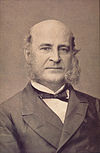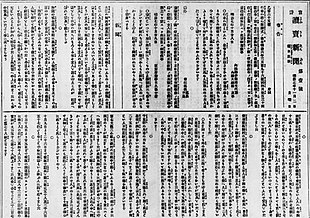
Back Portail:Conservatisme French Portal:Konservatisme NB Portal:Conservadorismo Portuguese Portal:Konservatism Swedish
| Main page | Showcase | Project |
Introduction
Conservatism is a cultural, social, and political philosophy and ideology, which seeks to promote and preserve traditional institutions, customs, and values. The central tenets of conservatism may vary in relation to the culture and civilization in which it appears. In Western culture, depending on the particular nation, conservatives seek to promote and preserve a range of institutions, such as the nuclear family, organised religion, the military, the nation-state, property rights, rule of law, aristocracy, and monarchy. Conservatives tend to favour institutions and practices that enhance social order and historical continuity.
Edmund Burke, an 18th-century Anglo-Irish statesman who opposed the French Revolution but supported the American Revolution, is credited as one of the forefathers of conservative thought in the 1790s along with Savoyard statesman Joseph de Maistre. The first established use of the term in a political context originated in 1818 with François-René de Chateaubriand during the period of Bourbon Restoration that sought to roll back the policies of the French Revolution and establish social order.
Conservatism has varied considerably as it has adapted itself to existing traditions and national cultures. Thus, conservatives from different parts of the world, each upholding their respective traditions, may disagree on a wide range of issues. Historically associated with right-wing politics, the term has been used to describe a wide range of views. Conservatism may be either libertarian or authoritarian, populist or elitist, progressive or reactionary, moderate or extreme. (Full article...)
Selected article
Selected quote
Conservative: One who admires radicals a century after they're dead.
— Leo Rosten, in R.L. Woods's The Modern Handbook of Humor (1967)
Selected image
The Yomiuri Shimbun is a Japanese newspaper published in Tokyo, Osaka, Fukuoka, and other major Japanese cities. It is one of the five national newspapers in Japan; the other four are the Asahi Shimbun, the Mainichi Shimbun, Nihon Keizai Shimbun, and the Sankei Shimbun. The headquarters is located in Otemachi, Chiyoda, Tokyo. Founded in 1874, the Yomiuri Shimbun is credited with having the largest newspaper circulation in the world having a combined morning and evening circulation of 14,323,781 through January 2002. The Yomiuri Shimbun is conservative and sometimes considered a centre-right newspaper.
Credit: Akira
Did you know...
- ...that Fred Ryan was instrumental in the development of the Ronald Reagan Presidential Library?
- ...that the Duncan L. Hunter 2008 presidential campaign was endorsed by both Chuck Yeager and Ann Coulter?
- ... that during World War I, future Norwegian politician and railroad chairman Egil Werner Erichsen was hit by the Spanish flu, but did not spend one day in bed?
Selected anniversaries in June
- 1979 – in the United States, the Moral Majority is founded by Jerry Falwell and Paul Weyrich.
- 1983 – the United Kingdom general election was held on 9 June. It gave the Conservative Party under Margaret Thatcher the most decisive election victory since that of Labour in 1945.
- 1987 – in a reference to the Berlin Wall, US President Ronald Reagan challenges Soviet leader Mikhail Gorbachev to "Tear down this wall!"
Topics
Associated Wikimedia
The following Wikimedia Foundation sister projects provide more on this subject:
-
Commons
Free media repository -
Wikibooks
Free textbooks and manuals -
Wikidata
Free knowledge base -
Wikinews
Free-content news -
Wikiquote
Collection of quotations -
Wikisource
Free-content library -
Wikiversity
Free learning tools -
Wiktionary
Dictionary and thesaurus
© MMXXIII Rich X Search. We shall prevail. All rights reserved. Rich X Search









